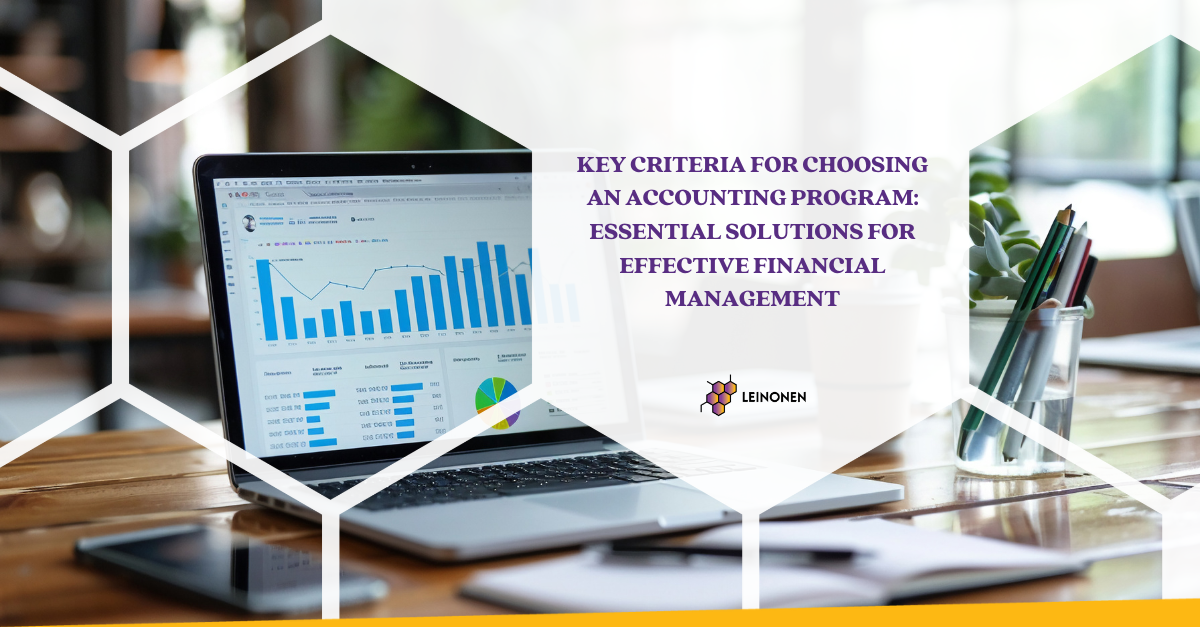In today’s business environment, financial accounting and operations management are inseparable from the use of digital tools and advanced applications. Whether establishing a new company, expanding an existing business, or upgrading an accounting program, it is essential to assess whether the selected financial management system is user-friendly, tailored to the company’s daily processes and needs, and capable of efficiently handling financial data.
In this article, we will outline the key criteria to consider when selecting an accounting management program.
Company specifics, goals and needs
A key criterion for selecting a financial accounting program is its ability to comprehensively cover all essential areas of the company’s operations. Depending on the company’s size, growth potential, and specific activities (such as production, trade, or e-commerce), it is important to assess the program’s functionalities and capacity. This includes managing purchase and sales documents, overseeing assets, stock, and warehouse accounting, as well as handling wages, contracts, and project accounting.
For large or fast-growing companies, another critical factor is the availability of accounting modules and the ability to customize them to meet the specific needs of the enterprise.
Costs of purchasing, maintaining and updating the accounting program
When evaluating the cost of an accounting program, it’s essential to consider not only the initial license fee but also the ongoing expenses for maintenance and updates.
The total cost often includes installation and training, ongoing technical support, user guides, and administration. It is important to clarify in advance whether future updates are included in the purchase price or if additional fees will apply.
The more tasks and responsibilities employees within the company can handle independently, the less you will need to rely on software implementation partners, reducing additional expenses. However, for more complex accounting programs with non-standard functionalities tailored to the unique needs of a specific company, the costs of maintenance and administration tend to be significantly higher.
Capabilities of automatic integrations and interfaces with other business management programs
Capabilities of Automatic Integrations and Interfaces with Other Business Management Programs
A key advantage of an accounting program is its ability to directly integrate with the document management system. Through such integrations, specific catalogs, such as received VAT invoice registers, can be seamlessly linked to the accounting program, allowing automated import into the accounting system using advanced solutions.
Integration with personnel management programs also significantly simplifies accounting and HR administration. By automating the exchange of information, such as employee absences (illness, vacation, or other leave) and salary-related data (business trips, parental allowances, number of children, etc.), these programs enable automated calculations for wages, taxes, and benefits. This reduces the need for manual data entry and minimizes the risk of errors.
For companies managing substantial goods or inventory flows, assessing the accounting program’s integration capabilities with warehouse management systems is essential. Such integrations are particularly relevant for businesses operating in trade, manufacturing, logistics, e-commerce, pharmaceuticals, and food and beverage industries. They streamline order execution and inventory tracking, provide real-time updates on stock, generate informative reports, and optimize supply chain processes. These integrations not only boost operational efficiency but also strengthen a company’s competitive edge.
Another critical factor is the program’s interface with other business management systems, such as CRM, e-commerce platforms, EDI, or business intelligence tools like Power BI. Such system integrations ensure seamless data import into the accounting system in real-time.
It is also essential to verify whether the accounting system supports the required report formats, such as SAF-T or other mandatory reports dictated by legislation.
With these integrations and tools, company managers can access up-to-date information and make strategic decisions quickly.
Possibilities of accounting automation: essential solutions for modern accounting
Today, many repetitive financial accounting operations are facilitated by automated or robotic solutions that allow you to work faster, more accurately and efficiently.
Below are some of the most popular solutions that have become essential in modern accounting management practices:
- Automatic import and export of payment information into electronic banking systems.
- Automatic settlement of receipts and expenses with debts, including sending reminders for overdue debts.
- Generation of sales invoices in alignment with orders placed.
- Calculation of wages and related taxes based on predefined settings.
- Mass accounting period closing procedures, such as automated handling of depreciation of fixed assets.
In addition to the standard and above-mentioned functionalities, modern accounting systems are increasingly incorporating innovative solutions. While not yet widely adopted, these features are becoming a significant factor when choosing an accounting program:
- Automatic registration of invoices in accounting systems.
- Automated generation of payments to suppliers and institutions;
- Preparation of tax reports and declarations in compliance with existing legislation, in the formats established by authorities or through direct integrations with institutional data systems.
- Real-time formation of financial and management reports, with data analysis carried out using integrated financial analytics tools.
- Automatic registration, verification, approval, conformity assessment, and control of projects, contracts, and other accounting operations and expenditure documents.
- Automatic budget control.
By adopting these automated solutions, businesses can enhance the efficiency of their accounting processes, ensure accuracy and compliance while minimizing errors and manual workload.
The company’s development plans and the opportunity to expand into international markets
The accounting program must comply with both local and international accounting standards. As the company grows and expands its operations, it is essential that the program remains flexible and easily integrates with new modules and functionalities. Additionally, it must be capable of processing an increasing number of documents and users while enabling straightforward administration and access management for users with different levels and rights.
For companies within a corporate group, the selection of an accounting program should consider the ability to automatically consolidate and exclude the operations of subsidiaries and related companies, eliminate intergroup transactions in financial statements, and, if necessary, recalculate financial data in the base currency. The program should also support the use of standard templates for generating essential reports and data.
The ability to form management reporting templates
It is important for managers of organizations to quickly and conveniently generate monthly, annual, and other relevant reports. The capability to create custom reporting templates and sets within the accounting program enables faster and data-driven decision-making. Some accounting programs include analytics modules that allow for easy filtering, grouping, and visualization of information, simplifying the synthesis and presentation of key data to company representatives.
Compliance with security, GDPR and other regulatory requirements
Ensuring the security of financial data is one of the greatest challenges in the digital era. When selecting an accounting program, it is essential to ensure that financial data is collected and stored in full compliance with the latest data protection regulations, including GDPR. The system should offer automatic backup and restoration options to prevent data loss in cases of system failure, cyberattacks, or natural disasters.
To maintain data security, the implementation of robust protection measures against unauthorized access is crucial. This includes password management, data encryption, and strict control over user authentication and access. Advanced systems should allow for the assignment of user rights, ensuring employees only access financial information relevant to their roles. All critical actions or changes performed in the system must be logged and protected, along with the identification of the users who carried them out.
Finally, a modern accounting management system must be equipped with antivirus, anti-intrusion, and cyber-attack prevention solutions.
Convenience of use, mobility and remote access
When selecting an accounting system, user convenience is paramount. Key aspects include a well-structured control panel, an intuitive interface for operations and reporting, and fast, seamless data entry where information entered once is automatically applied to related operations. An intuitive system fosters quicker adoption and smoother daily use.
The ability to access the system through a mobile application or browser is a significant advantage, especially given the widespread adoption of remote and hybrid work models. Mobility and accessibility are closely tied to the ability to connect from various devices, such as computers, tablets, or phones, enabling users to efficiently manage accounting data and share information regardless of location or device type.
An accounting program that allows communication and information exchange both within the system and with external contacts greatly simplifies the work of accountants. Features such as document viewing, validation, and digital signing streamline accounting processes. Additionally, automated functionalities for sending notifications, reconciliation acts, purchase orders, or confirmations contribute to a more efficient, high-quality, and documented workflow.
Reputation, reliability and experience of the program partners
When establishing long-term business relationships and selecting partners for accounting or business management systems, it is crucial to carefully assess who will be entrusted with the program’s implementation. The partner’s ability to fulfill long-term commitments and promptly address critical issues is essential for successful cooperation.
Partners with several years of market experience are likely to be more reliable, having learned from previous projects and able to perform installations with greater quality and efficiency. Choosing experienced partners helps avoid mistakes and additional costs. Moreover, their experience with similar companies can be a significant advantage, enabling tailored solutions to meet the specific needs of your business.
After evaluating the above criteria, selecting an accounting program becomes a more informed and reasonable decision that delivers long-term value. If a company lacks sufficient human and financial resources or expertise for effective financial management, outsourcing accounting processes or parts of them to external partners may be a beneficial option. Accounting service providers typically possess extensive experience across various business sectors, broader competencies, and knowledge of compliance requirements. They also select accounting programs adapted to diverse company needs, ensuring sustainable and successful partnerships.





